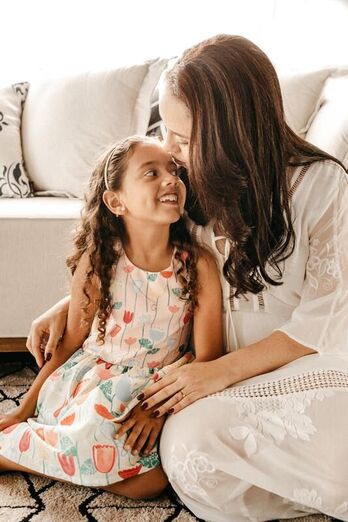Are You Struggling to Find the Right Help for Your Child (age 3-11)?
- Is your child having difficulty maintaining or building friendships?
- Does your child seem worried, stressed, or anxious?
- Are they having a hard time with school?
- Does your child have emotional outbursts?
- Does your child struggle to feel good about themselves?

It can be painful to watch your child struggle and even more difficult when you are unsure of what to do to help them. It can leave you questioning your ability to parent and feeling uncertain about their future. We wish for our children to thrive but may feel helpless to even know how to begin the journey.
As a parent, you might be noticing that your other children have an easier time with their relationships, communicating their ideas, persisting with challenges, and managing their emotions. When our children struggle with the development of these social-emotional skills, it can be overwhelming for them. They may experience never-ending hurdles at home and school. They may feel lonely in the school yard, have tantrums, or criticize themselves for not doing well enough.

Parents, teachers, and other caregivers may struggle to know how to address these concerns and often attend to observable behaviors rather than the less salient underlying need. Children’s attempts to get their needs met may often look like behavioral issues, distress, or struggles in relationships. Additionally, the underlying needs can be a part of symptoms of anxiety, stress, or Attention Deficit-Hyperactivity Disorder (ADHD), which can add to struggles now and into the future. As children build these skills, they often begin to feel better about themselves and engage differently with the world. Simultaneously, parents may begin to experience relief and more efficacy in their role.
The truth is being a child is hard. Each child is different, as is their approach to life’s challenges. Child therapy can support you and your child in learning ways to address current challenges and leading a successful life.
The truth is being a child is hard. Each child is different, as is their approach to life’s challenges. Child therapy can support you and your child in learning ways to address current challenges and leading a successful life.
It’s Common for Children to Struggle as They Grow Up
Almost every child will experience struggles at some time. It is a normal part of life and growing up. Some children, however, battle with these issues longer and harder than others. Up to one in five children meet the criteria for a mental health diagnosis related to behavior, anxiety or ADHD¹.
It can be hard for parents, caregivers, and teachers to recognize behavioral or emotional distress in children early on. It may be that we hold the misconception that it is something that will alleviate itself. While this may be true in some cases, it isn’t for all. This line of thinking often prevents the parents from seeing the importance of getting ahead of the issues before they worsen or have a negative impact on their child. A study conducted by the CDC¹ suggests that mental health disorders can increase as children grow older.
It can be challenging to decide whether therapy can be helpful for your child or even to determine where to start. However, working with a child therapist can support you in determining the best approach to help your child live a well-adjusted and fulfilled life.
It can be hard for parents, caregivers, and teachers to recognize behavioral or emotional distress in children early on. It may be that we hold the misconception that it is something that will alleviate itself. While this may be true in some cases, it isn’t for all. This line of thinking often prevents the parents from seeing the importance of getting ahead of the issues before they worsen or have a negative impact on their child. A study conducted by the CDC¹ suggests that mental health disorders can increase as children grow older.
It can be challenging to decide whether therapy can be helpful for your child or even to determine where to start. However, working with a child therapist can support you in determining the best approach to help your child live a well-adjusted and fulfilled life.
Therapy for Kids Can Provide Tools to Manage Feelings and Behaviors
When seeking support for your young child, it is important to meet with a therapist that has expertise in child therapy and, together, determine the root causes of the challenges occurring. When the focus is solely on the child’s behavior, you may miss the cause and provide only a temporary solution. By understanding and addressing the cause through child therapy, long-term change is possible.
At Harmony in Parenting, we provide skills and strategies to parents and children, utilize in-the-moment experiences to build social-emotional skills, and promote the development of problem-solving and planning. This helps parents get through everyday life and support positive long-term outcomes.
At Harmony in Parenting, we provide skills and strategies to parents and children, utilize in-the-moment experiences to build social-emotional skills, and promote the development of problem-solving and planning. This helps parents get through everyday life and support positive long-term outcomes.
What to Expect During Initial Session
During the initial therapy session, we will explain the way we approach our work with children and families and what you might expect from therapy. The first few sessions allow for us to take time together and consider if the therapeutic relationship and scope of practice are aligned with the needs of your child. If not, we will provide you with referrals that may better meet the needs of your family.
The goal in the initial sessions is to understand what brings you and your child into therapy, the history of your child’s challenges, and the approach that has been taken in the past. We will collaborate to determine the goals and treatment plan to address the unique issues your child faces.
During the initial therapy session, we will explain the way we approach our work with children and families and what you might expect from therapy. The first few sessions allow for us to take time together and consider if the therapeutic relationship and scope of practice are aligned with the needs of your child. If not, we will provide you with referrals that may better meet the needs of your family.
The goal in the initial sessions is to understand what brings you and your child into therapy, the history of your child’s challenges, and the approach that has been taken in the past. We will collaborate to determine the goals and treatment plan to address the unique issues your child faces.
How We Tailor Our Approach to Your Child’s Unique Need
Our clinicians at Harmony in Parenting provide integrative therapy for children which allows for an individualized approach to address presenting issues and symptoms. We utilize research-informed theories and approaches to understand and support the needs of your child.
As a part of our work, we help children and their parents to understand and address the way their thoughts, feelings, behaviors, and environment are connected. We support families in developing mindfulness skills that help them to achieve their goals, learn more about themselves, and develop flexibility in how they approach situations.
At times we integrate a play therapy approach in child counseling sessions. Children often communicate better through play, art, and storytelling. Child centered play therapy helps them work through complex situations, navigate developmental issues, and learn social skills.
As a part of our work, we help children and their parents to understand and address the way their thoughts, feelings, behaviors, and environment are connected. We support families in developing mindfulness skills that help them to achieve their goals, learn more about themselves, and develop flexibility in how they approach situations.
At times we integrate a play therapy approach in child counseling sessions. Children often communicate better through play, art, and storytelling. Child centered play therapy helps them work through complex situations, navigate developmental issues, and learn social skills.
Frequently Asked Questions About Child Counseling..
How much time does child therapy take?
Admittedly, child therapy is a process which may provide a pathway to support your child in addressing present and future challenges. The length of therapy is based on a number of factors including the family and child’s needs, symptoms, progress, and preferences and is best addressed through collaborative discussion.
Admittedly, child therapy is a process which may provide a pathway to support your child in addressing present and future challenges. The length of therapy is based on a number of factors including the family and child’s needs, symptoms, progress, and preferences and is best addressed through collaborative discussion.
When is a good time to start therapy for children?
There are many points in time in which therapy can be helpful. Whether you are seeking to help your child manage struggles before they progress or address an issue that is already occurring, therapy can be a beneficial tool. If you have tried a variety of strategies to support your child or have not seen improvement, having an initial consultation with one of our therapists can help you determine if therapy is the next best step.
If your child, however, has begun demonstrating self-injury or suicidal thinking, we highly recommend seeking a therapist that specializes in this area to best support your child.
There are many points in time in which therapy can be helpful. Whether you are seeking to help your child manage struggles before they progress or address an issue that is already occurring, therapy can be a beneficial tool. If you have tried a variety of strategies to support your child or have not seen improvement, having an initial consultation with one of our therapists can help you determine if therapy is the next best step.
If your child, however, has begun demonstrating self-injury or suicidal thinking, we highly recommend seeking a therapist that specializes in this area to best support your child.
How will I be involved in my child’s therapy?
Our practice focuses on work with children ages 3-11, which would naturally entail collaboration with parents given the child’s development. Depending on the presenting issue, and needs of the family, parent involvement may vary and even change over time. Our therapists partner with parent and child to find the most helpful approach.
As we are a practice that utilizes a collaborative approach to support children, it is important to note that we do not specialize in divorce. For matters resulting as a result of divorce, we suggest seeking a divorce specialist.
Our practice focuses on work with children ages 3-11, which would naturally entail collaboration with parents given the child’s development. Depending on the presenting issue, and needs of the family, parent involvement may vary and even change over time. Our therapists partner with parent and child to find the most helpful approach.
As we are a practice that utilizes a collaborative approach to support children, it is important to note that we do not specialize in divorce. For matters resulting as a result of divorce, we suggest seeking a divorce specialist.
Therapy Can Help Your Child Thrive and Achieve More Success

Watching your child struggle is one of the hardest things you can do as a parent. You don’t have to work through their issues alone. We are here to support you and your child when the time is right for you.
Reach out today for a complimentary consultation to get started.
Read our blogs...
¹ https://www.cdc.gov/childrensmentalhealth/features/kf-childrens-mental-health-report.html
² https://www.cdc.gov/childrensmentalhealth/features/COVID-19-helping-children-transition-back-to-school.html
³ https://www.ncbi.nlm.nih.gov/pmc/articles/PMC7481176/pdf/main.pd
² https://www.cdc.gov/childrensmentalhealth/features/COVID-19-helping-children-transition-back-to-school.html
³ https://www.ncbi.nlm.nih.gov/pmc/articles/PMC7481176/pdf/main.pd

